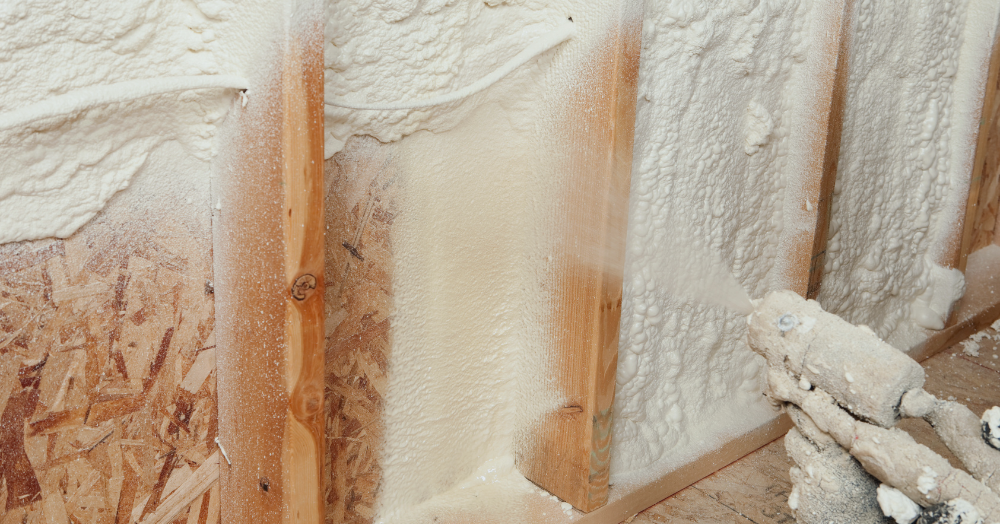
The Hidden Cost of Spray Foam Insulation
Spray foam insulation, once celebrated for its energy-saving benefits, has become a hidden obstacle for many homeowners looking to sell. Mortgage lenders are increasingly reluctant to finance properties with this type of insulation due to potential structural risks, leaving countless homes unsellable.
Why is Spray Foam Insulation Problematic for Mortgage Lenders?
The primary issue with spray foam insulation lies in its potential to compromise the structural integrity of a property’s roof. Many lenders are cautious about approving mortgages for properties with spray foam insulation because of:
- Moisture Risks
Poorly fitted spray foam can trap moisture, leading to timber decay. This not only risks long-term structural damage but also makes it difficult for surveyors to assess the true condition of the roof.
- Ventilation Issues
Closed cell spray foam, in particular, can restrict air circulation, causing timber to rot over time. While open cell spray foam is more breathable, it is often installed incorrectly, exacerbating ventilation problems.
- Difficulty for Valuers
The thick, expansive nature of spray foam often obscures roof timbers, making it challenging for surveyors to inspect and lenders to assess the risk.
Real Examples from the WhiteKnights Team
Rob Milne from WhiteKnights has seen several local examples of how spray foam insulation has caused issues for sellers. In one case, a homeowner in Reading struggled to sell their family home because lenders were unwilling to approve mortgages for potential buyers due to spray foam in the loft. Despite having documentation to show the insulation was professionally installed, they eventually had to pay for its removal, a costly process that delayed their sale by months.
In another instance, a couple looking to downsize found themselves in limbo when buyers pulled out after a surveyor flagged the spray foam as a potential issue. These real-life cases highlight how significant this problem has become in the Reading area.
What Can Homeowners Do?
If your property has spray foam insulation and you're considering selling, here are some proactive steps:
- Gather Documentation
Provide evidence that the insulation was professionally installed and adheres to safety and building standards. If available, secure a specialist report validating the roof's structural integrity.
- Consult Lenders Early
If you’re aware of spray foam in your property, reach out to potential lenders early in the process to understand their policies.
- Consider Removal
While expensive, removing spray foam insulation may be necessary to ensure your property is marketable. Costs vary depending on the size and complexity of the job, so obtain multiple quotes.
Advice for Buyers
If you’re considering purchasing a home with spray foam insulation, proceed with caution:
- Request a Specialist Inspection
Ensure the roof is thoroughly inspected by a professional who can assess the risks and provide a detailed report.
- Check with Lenders
Before committing to the purchase, confirm whether your mortgage provider will lend against the property.
Industry Efforts to Address the Problem
In response to the growing concern, the Property Care Association (PCA) published an inspection protocol in 2023 to assist surveyors and lenders in evaluating spray foam insulation risks. However, there remains significant variability in lender policies, and many homeowners feel caught in limbo.
The Insulation Manufacturers Association continues to defend spray foam insulation, stating that when properly installed, it can be a safe and effective solution. Nonetheless, the industry acknowledges the need for better oversight and clearer guidelines.
Conclusion
Spray foam insulation has proven to be a double-edged sword. While it offers energy-saving benefits, the challenges it poses to mortgage lending and property sales cannot be ignored. Whether you’re a homeowner or a buyer, understanding the risks and taking the appropriate steps to mitigate them is crucial.
If you’re facing difficulties selling a property due to spray foam insulation, or are unsure about your options, our team at WhiteKnights is here to help. Contact us for expert advice and support as you navigate this complex issue.
Need More Help?
At WhiteKnights, we specialise in guiding homeowners through challenging situations like this. Whether it’s connecting you with trusted surveyors or advising on your property’s marketability, we’re here to help. Reach out today!
Call: 0118 334 7410